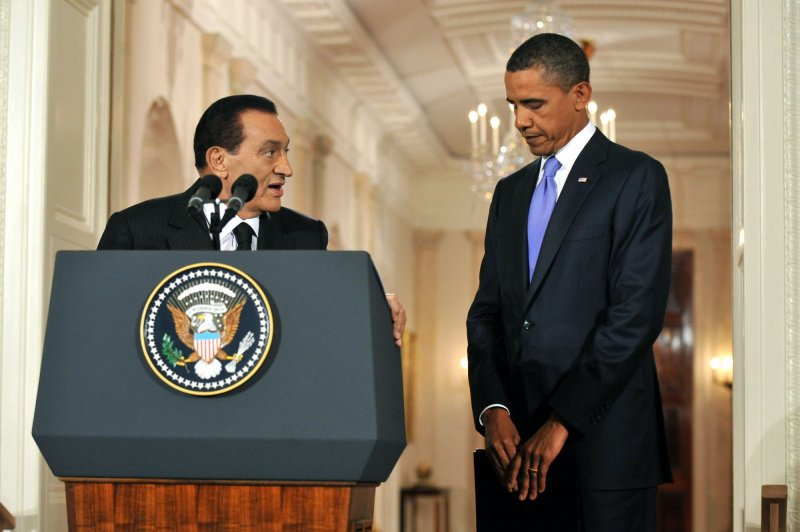President Hosni Mubarak of Egypt (L) speaks alongside U.S. President Barack Obama following a meeting in Washington Sept.1, 2010. UPI/Kevin Dietsch |
License Photo
CAIRO, Jan. 28 (UPI) -- Protesters set fire to National Democratic Party headquarters in Cairo Friday amid predictions the regime of Egyptian President Hosni Mubarak would fall.
Mubarak addressed the nation on television early Saturday, announcing he had ordered Cabinet ministers to resign but saying he would retain power, and would use force to stop anything that would "threaten peace."
At least three people died in the latest of a series of protests, apparently sparked by the ouster this month of the Tunisian government. At least 10 people have died in this week's protests.
Protesters called Friday "Angry Friday."
Tens of thousands of people were involved in the demonstrations.
Al-Masry al-Youm reported NDP headquarters was set aflame about 6:30 p.m. after a day of protests that had military equipment in the streets and police lobbing tear gas canisters and shooting water cannon and rubber bullets at demonstrators. The protesters pushed their way toward the presidential palace and journalists covering the demonstrations were attacked, the newspaper said.
Mubarak told state-run television viewers Saturday he would issue "very specific goals" to new ministers to address the causes for the protests that have swept across Egypt, The Washington Post reported.
Mubarak's address came after Egyptian military units were deployed in Cairo, the newspaper said.
Mubarak, 82, said he had ordered government officials to give protesters "space" to voice their objections but insisted he would preserve security.
"There is a very thin line between freedom and chaos," he said. "I am absolutely on the side of freedom for each citizen, and at the same time I am on the side of the security of Egypt. And I would not let anything dangerous happen that would threaten peace … and the future of the country."
About an hour after Mubarak spoke, U.S. President Barack Obama said he had spoken by telephone with Mubarak and urged the Egyptian leader to "refrain from any violence against peaceful protesters."
Appearing briefly before reporters at the White House late Friday Obama said Mubarak pledged to promote better democracy and greater economic opportunity.
"I told him he has a responsibility to give meaning to those words, to take concrete steps and actions that deliver on that promise," Obama said.
He also urged Egyptian authorities to rescind action taken to cut off Internet access, cellphone service and social media, and called on the government and protesters to avoid violence.
"We've also been clear that there must be reform: political, social and economic reforms that meet the aspirations of the Egyptian people," Obama said. "We are committed to working with the Egyptian government and the Egyptian people."
Security forces tried to keep protesters penned in Tahrir Square but they forced their way across Qasr al-Nil Bridge and into the heart of Cairo.
"This kind of violence will be counterproductive, and it will backfire in their face, if not today, tomorrow," said Mohammed ElBaradei, leader of the National Association for Change and among those running for president.
ElBaradei, the former head of the International Atomic Energy Agency, was pulled to safety inside a mosque as police attempted to disperse protesters, al-Masry al-Youm reported.
"I used to call for a transitional period by peaceful and democratic methods, but the regime is closing that door. I have no doubt that the people will win," said ElBaradei, whose clothes were soaked, his mouth and nose covered by a blue mask. He arrived in the country Thursday from Vienna.
Protesters demonstrated across the country following a call from the Muslim Brotherhood for "Angry Friday."
Ibrahim Eissa, former editor in chief of al-Dostour, said he thinks the government fears the demonstrations are turning into a revolution.
"It's clear now that the regime is stupid," he said.
ElBaradei called on the international community "to express its views on the so-called stability of the Egyptian government. If they do not do that now, they will lose any residue of credibility they have left in Egypt and the rest of the Arab World."
An estimated 40,000 demonstrators clashed with police in Beheira along the Nile River, witnesses said.
Al-Masry al-Youm quoted witnesses as saying 20,000 protesters in Sa'a Square in Damanhour, the capital of Beheira, were dispersed with tear gas and rubber bullets.
The special operations counter-terrorism force, rarely seen on Cairo's streets, manned positions in strategic locations, including Tahrir Square, where the biggest demonstrations against Mubarak's 30-year-rule took place.
Egyptian media personality Emad Adib told al-Masry al-Youm a number of Egyptian businessmen sent funds abroad following anti-government demonstrations Tuesday. Businessmen may leave the country and government officials may resign if the situation escalates, he said.
"The people who took to the streets do not belong to political parties, nor do they have political orientations. They are the Internet generation," he told the newspaper.
Internet and cellphone service was blocked and text-messaging services were disabled early Friday to limit activists' ability to organize, activist intermediaries told United Press International in an e-mail.















